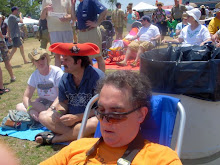Batson with Teeth: Examining Miller-El
Racial discrimination in jury selection has gone on ever since the jury ceased to consist wholly of white, property owning males. In a case every law student for the last nineteen years has studied, Batson v. Kentucky, the Supreme Court determined that racial discrimination during jury selection violated the Equal Protection Clause of the Fourteenth Amendment to the United States Constitution. However, the test the Court made available was so feeble that it quickly became a joke.
The test in Batson was to object, showing a pattern of the other side excluding black jurors. If the objecting party raises an inference that the other party has excluded jurors because of race, the burden shifts to the other party to give some legitimate race-neutral reason for their jury selections.
This is where the joke comes in. Typical race-neutral reasons include that the juror in question was paying too much or too little attention, looked sleepy, looked wired, had the same hairstyle as the defendant or victim, dressed too sloppy, yawned, had facial hair, looked at the attorney "funny," etc. Court watchers have been waiting for a prosecutor to complain that a juror was removed because they had the same blood type as the accused.
Monday, the Supreme Court finally came to grips with the limp remedies in Batson. In Miller-El v. Dretke, the Court required, finally, that the explanations as to why jurors were stricken be clear and reasonably specific, and that a failure to provide adequate justifications can be established through looking at a disparity in the questioning of white and black jurors.
Most importantly, the Court held that if the reasons given for striking jurors do not hold up, it doesn't matter if there were other, legitimate reasons for the strikes. The reasons given must stand or fall on their own merits.
This case should make it easier to successfully object to racial jurymandering at trial. A better explained standard, with more definite rules, is easier to meet. But will it in practice? I would argue that Batson objections will be as rarely successful in the future as before. My cynical prediction is that attorneys will become better at rationalizing racially-neutral excuses for their jury strikes.
Of course, we all know the different between a cynic and a realist. The answer to that riddle is: not much.


0 Comments:
Post a Comment
<< Home